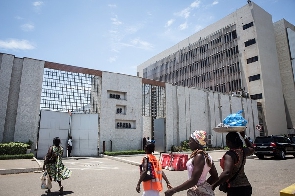Banks are still waiting on the Central bank to offer specific guidelines on the measures introduced – including reduction in interest rates and reserve requirements to combat impacts of the Coronavirus pandemic, since being without timelines and durations makes planning difficult.
Despite their introduction in March, 2020 – with banks responding by cutting lending rates, introducing moratoriums and other incentives to cushion customers – the lenders are on edge and looking for the regulator to bring guidelines on how long these interventions will last, so they can properly factor them into their operations for the long-term.
Speaking at the fifth edition at the B&FT-organised Ghana’s Most Respected CEOs Breakfast Series, John Awuah – Deputy CEO of the Ghana Association of Bankers – said the association is urgently seeking the guidelines which are said to be in draft form and will be completed soon to give banks a better forecast.
“We are having discussions with the regulator and the guidelines are under preparation. Last time, the regulator said they are actually in draft and very soon we are going to have those guidelines. That will go to help us to operate, control and know that this is what we can do with the measures which the Governor has introduced,” Mr. Awuah said.
Explaining why the guidelines are urgent necessity, he added: “You know banks like to operate with certainty; and the measures, as good as they are, they were in a statement of ‘do this, do that, we have allowed this, we have allowed that’ but it didn’t come with any strict kind of confines – as in, ‘if you do this, this is the timeline before we analyse and take a decision’.
“We are expecting some guidelines as to what we can use the excess liquidity for. Yes, we are told that we can use it for lending, which is what banks have also taken on board; but we wanted to know the availability period. Let us say two years, or it is going to be available until such time we give you sufficient notice that it is no more going to be available? Additional guidelines would provide some more clarity around the funds,” he said.
The measures introduced by the central bank in March 2020 to reduce the negative impact of Coronavirus on the financial sector and economy include a reduction of the Primary Reserve Requirement from 10 percent to 8 percent, and reduction of the Capital Conservation Buffer (CCB) for banks from 3 percent to 1.5 percent.
Other measures include the reduction of provisions for loans in the ‘Other Loans Especially Mentioned’ (OLEM) category from 10 percent to 5 percent for all banks and SDIs, as a policy response to loans that may experience difficulty in repayments due to the slowdown in economic activity; and loan repayments that are past due for Microfinance Institutions for up to 30 days shall be considered as ‘Current’, as is the case for all other SDIs.
The Bank of Ghana also ordered banks and Specialised Deposit-Taking Institutions (SDIs) to suspend the declaration and payment of dividends or distribution of any reserves to shareholders, and for making any irrevocable commitments until further notice. Despite this directive, some banks have secured permission to pay dividends after making the case of holding enough reserves to support the economy when called upon.
Business News of Friday, 7 August 2020
Source: thebftonline.com













